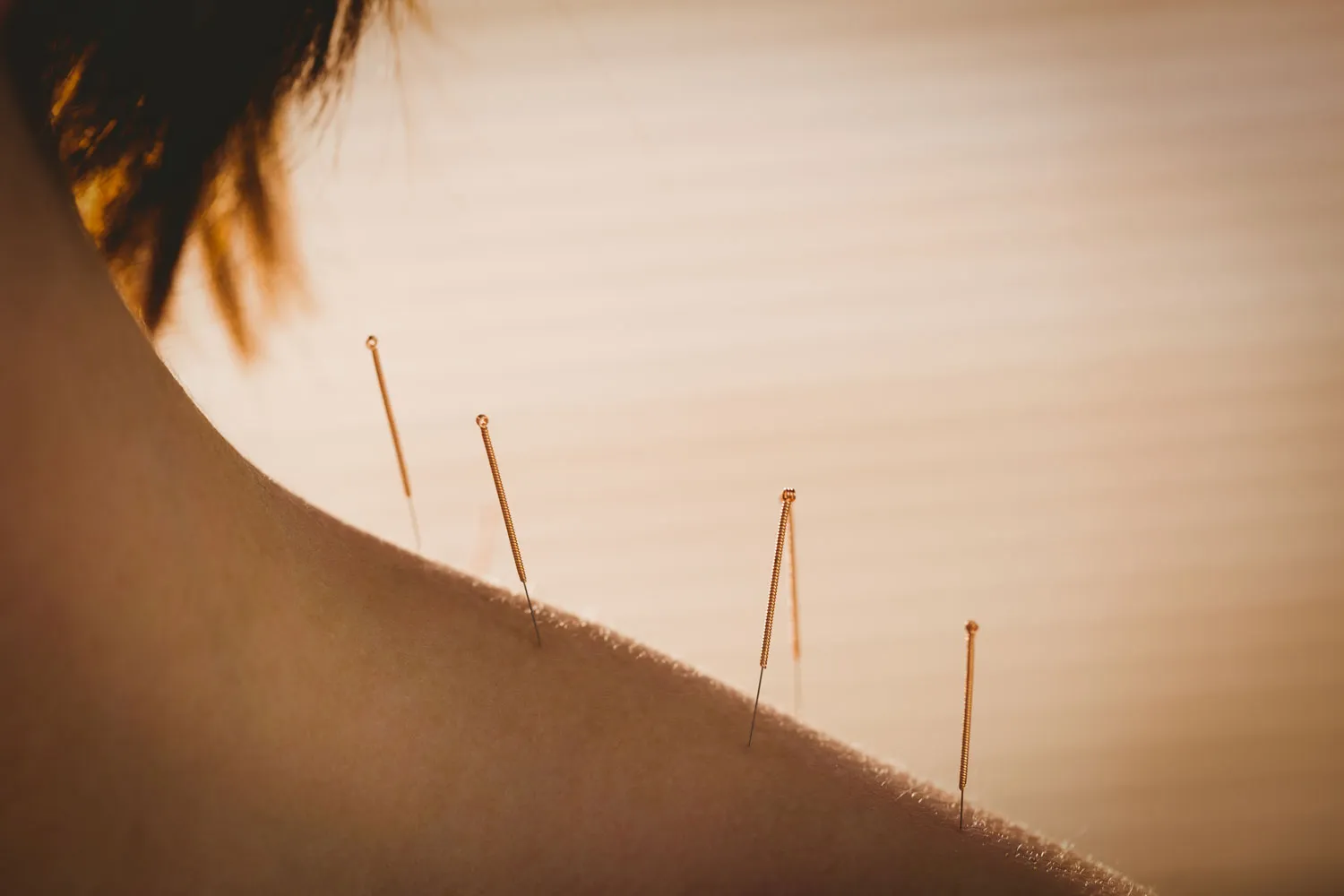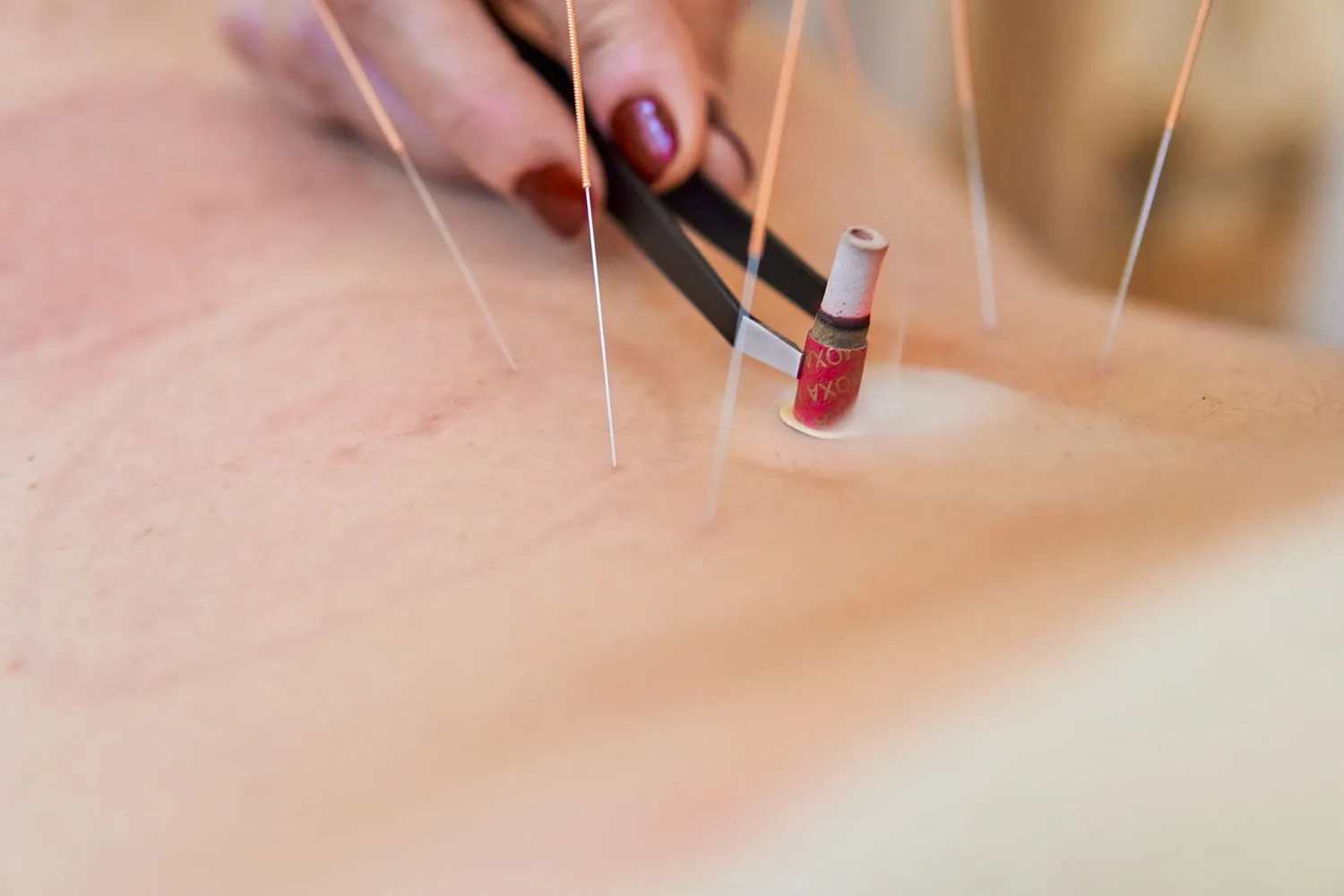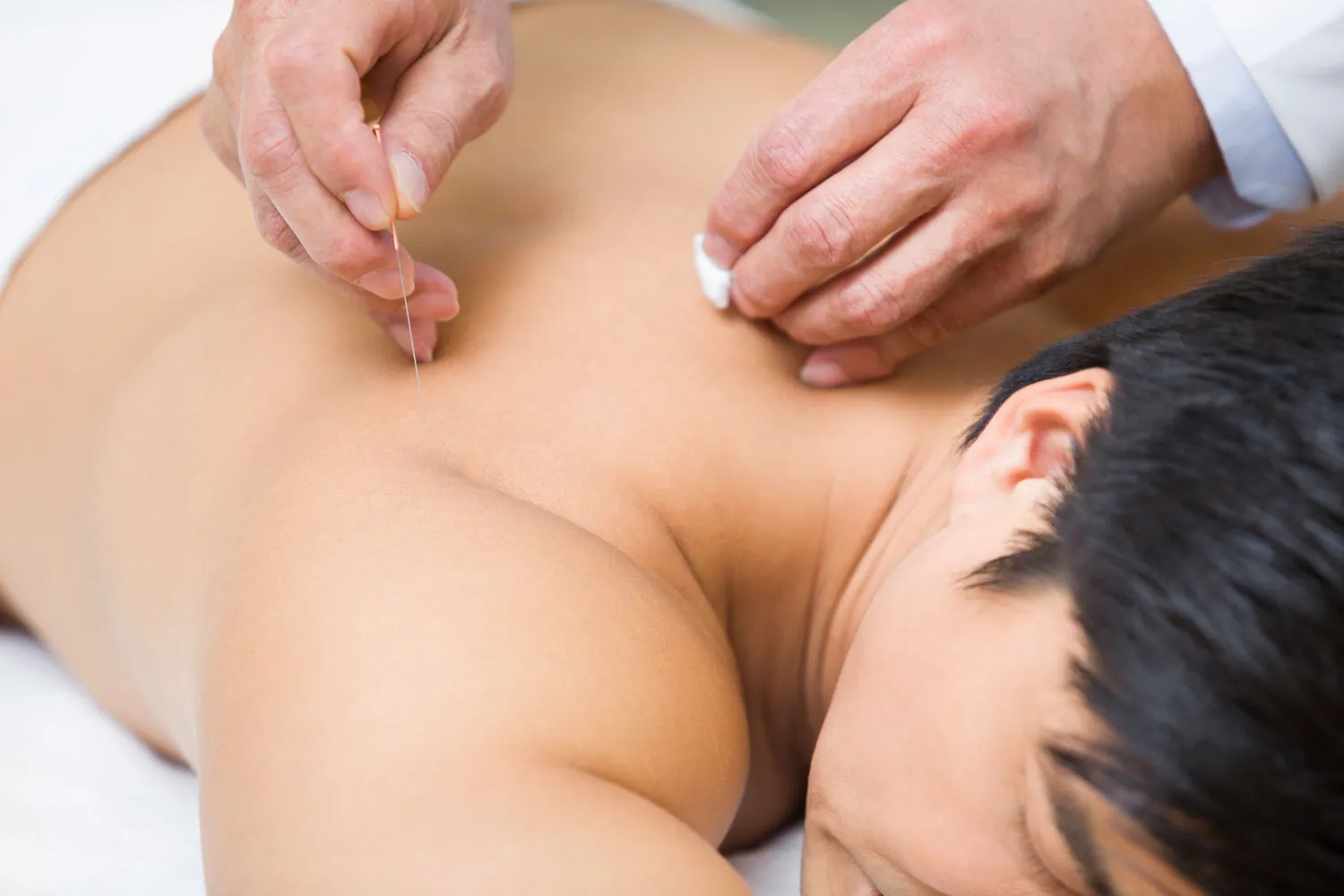Acupuncture
Acupuncture is a treatment derived from ancient Chinese medicine. Fine needles are inserted at certain sites in the body for therapeutic or preventative purposes.
Western medical acupuncture is the use of acupuncture following a medical diagnosis. It involves stimulating sensory nerves under the skin and in the muscles of the body.
This results in the body producing natural substances, such as pain-relieving endorphins. It’s likely that these naturally released substances are responsible for the beneficial effects experienced with acupuncture.
A course of acupuncture usually creates longer lasting pain relief than when a single treatment is used.


The National Institute for Health and Care Excellence (NICE) provides guidelines for the use of acupuncture
They currently recommend considering acupuncture for:
- Chronic tension type headaches
- Migraines
- Chronic pain
Acupuncture is also widely used for chronic pain resulting from other musculoskeletal conditions.
Acupuncture also helps relieve a wide range of conditions including
- Hayfever
- Menopause symptoms
- Anxiety
- IBS
- Infertility
- Nerve conditions ie bells palsy

Acupuncture Frequently Asked Questions
What is acupuncture?
This can be a very long winded and complex question to answer. Traditional Acupuncture is a form of traditional Chinese medicine that involves inserting thin needles into specific points on the body to promote healing and alleviate various physical and mental health conditions. This ancient practice is based on the belief that the body has a vital energy called “Qi” (pronounced “chee”) that flows through pathways called meridians. When this flow is disrupted, it can lead to illness or pain. Acupuncture aims to restore the balance of Qi and improve overall well-being.
Acupuncture is increasingly recognised and integrated into mainstream healthcare as a complementary therapy. It can be used alongside conventional treatments to enhance health outcomes and improve quality of life. Whether you are seeking relief from pain, stress, or other health issues, acupuncture offers a holistic approach to healing and well-being.
How does acupuncture work?
This is again a very complex question, with 2 main schools of thought. Below is a very brief summary of how each school can improve your wellbeing;
Acupuncture works by stimulating specific points on the body, known as acupuncture points, to promote healing and alleviate various health conditions. Here’s a brief overview of how it functions:
Traditional Chinese Medicine (TCM) Perspective
- Qi (Vital Energy) and Meridians
- Qi Flow: Acupuncture is based on the concept of Qi, the vital energy that flows through the body along pathways called meridians.
- Balancing Qi: Disruptions in Qi flow can lead to illness and pain. Acupuncture aims to restore the balance and smooth flow of Qi, promoting health and healing.
- Acupuncture Points
- Specific Sites: There are hundreds of acupuncture points on the body associated with different meridians and organs.
- Needle Insertion: Thin, sterile needles are inserted into these points to stimulate and balance the flow of Qi.
Western Medical Perspective
- Nervous System Stimulation
- Nerve Activation: Inserting needles into acupuncture points stimulates nerves, muscles, and connective tissues.
- Pain Relief: This stimulation can trigger the release of natural painkillers such as endorphins and serotonin.
- Improved Blood Circulation
- Enhanced Flow: Acupuncture increases blood flow to targeted areas, which helps reduce inflammation and promote healing.
- Neurotransmitter Regulation
- Chemical Balance: The procedure can influence the release of neurotransmitters and hormones, improving mood, reducing stress, and enhancing overall well-being.
Is acupuncture safe?
When performed by a trained and licensed acupuncturist, acupuncture is generally considered safe. The needles used are sterile and disposable, minimizing the risk of infection. However, it is important to disclose your medical history and any existing conditions to ensure a safe and effective treatment.
Does acupuncture hurt?
Most people will not feel any pain when acupuncture needles are inserted. A small percentage will feel a “scratch” for a very short period of time. Pain throughout a session is incredibly rare. Sensations such as warming and cooling around the area are more common, with many patients feeling incredibly relaxed during a treatment (one or 2 have been known to fall asleep!)
What conditions can acupuncture treat?
Acupuncture has been used to address a wide range of health conditions. It is commonly sought for pain management, such as headaches, back pain, arthritis, and menstrual cramps. Acupuncture can also be helpful for various other conditions, including stress, anxiety, insomnia, digestive disorders, allergies, and infertility. If you are unsure whether acupuncture may be helpful to you, please do contact us to clarify before booking.
Can acupuncture help with anxiety?
Yes, acupuncture can help with anxiety. It is increasingly recognised as a complementary treatment for anxiety disorders.
How many acupuncture sessions are needed?
The number of acupuncture sessions needed varies depending on the condition being treated and the individual’s response to the treatment. Some acute conditions may show improvement after just a few sessions, while chronic or more complex conditions may require multiple sessions over a longer period. Your acupuncturist will create a personalized treatment plan based on your specific needs. As acupuncture is an accumulative therapy, we recommend a minimum of 4 sessions to judge results from.
How long does an acupuncture session last?
An acupuncture session typically lasts between 30 minutes 45 minutes. The initial appointment is usually the slightly longer session as it involves a thorough consultation to understand your health history and concerns. Your acupuncturist will then determine the appropriate treatment plan and proceed with the session.
Are there any side effects of acupuncture?
Acupuncture is generally safe with minimal side effects. Some people may experience temporary soreness or bruising at the needle insertion site, which typically fades quickly. Occasionally, slight dizziness or fatigue may occur after a session. It is important to inform your acupuncturist if you have any concerns or experience any unusual reactions.
How long does acupuncture take to work?
This is very personal to each individual. Roughy 80% of all individuals will feel some sort of change/relief from acupuncture. With some people noticing change or steps towards their goal immediately after their session. Others may need multiple sessions before anything is felt. We will guide all individuals but often suggest that you give acupuncture 3-4 sessions before judging the outcomes. We are here to help you to progress and will be the first to suggest that you may be in the 20% that may not benefit. We are not a clinic that pushes more session if they are not helpful
Can acupuncture be used alongside other treatments?
Acupuncture can complement conventional medical treatments. It is often used alongside other therapies to enhance their effectiveness or manage side effects. However, it is crucial to inform both your acupuncturist and primary healthcare provider about any ongoing treatments or medications to ensure coordination and avoid any potential interactions.
Who can perform acupuncture?
Only qualified and registered practitioners can provide acupuncture. Some therapists may have a post graduate certificate or have attended a short course to use acupuncture. Our 2 outstanding therapists have a full degree in acupuncture and have attended many postgraduate courses on top of this. You’re In very safe hands at Parker & Jones.
Is acupuncture covered by insurance?
Acupuncture coverage varies depending on your insurance provider and policy. Some insurance plans offer partial or full coverage for acupuncture treatments, particularly for certain conditions. Contact your insurance company to inquire about their coverage for acupuncture or discuss it with your acupuncturist, who may provide assistance in navigating insurance matters.
Fozia is registered with her governing body meaning that most insurers that will cover acupuncture will cover sessions at our clinic; this includes Westfield.
Please note that while acupuncture has been shown to have positive effects on many individuals, individual responses and outcomes may vary. Roughly 80% of people will see some form of results using it, although we do recommend at least 4 sessions to see how you may respond. It is common to feel little to no change after the initial couple of sessions.






